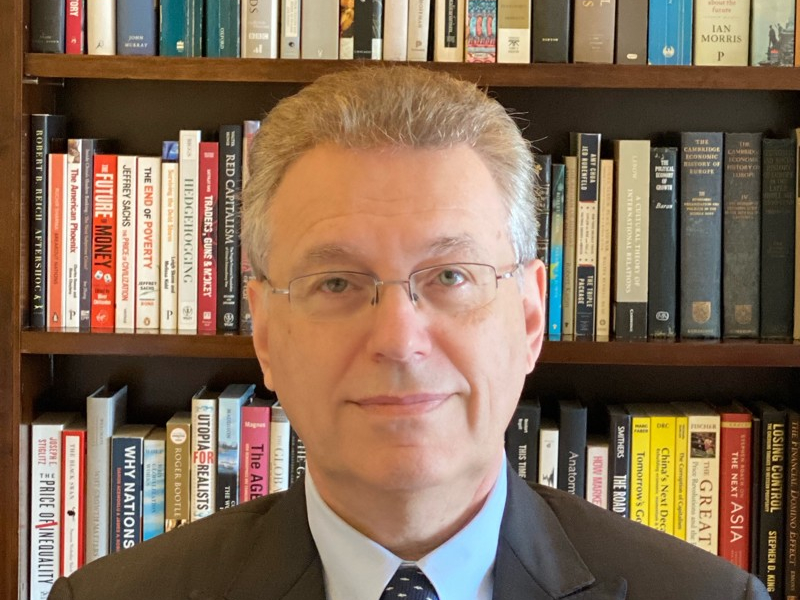In his new book The Twilight Before The Storm: From the Fractured 1930s to Today’s Crisis Culture, global strategist Viktor Shvets explores how we might avoid a world on fire.
Having just been announced as a speaker at Impact Investment Summit Asia Pacific 2025, Viktor sat down with me to discuss his latest book and what investors can expect in the coming decade.
According to Viktor, the next decade promises to be the most critical or hardest periods to transition from neoliberal capitalism toward a yet-to-be defined alternative system — will it be capitalism or communism, feudalism or despotism?
Viktor explains how the fusion of the disruptive Information Age and deep Financialisation, aggravated by generational change and climate, is destabilising every aspect of our lives — from the role and functioning of labour and capital to political systems, from the private sphere to morality, from education to entertainment.
As Mark Twain said, “History does not repeat itself but it often rhymes.” And Viktor considers whether we are bound to relive the 1930s and a world on fire of the 1940s, or transit toward a more placid but constrained 1950s-60s.
The 1930s is probably the most comparable to the period the world is likely to experience over the next decade, as he says there are far too many pervasive parallels to be a coincidence.
There are now numerous hot spots with a potential for conflict, fueled by similar preconditions as in the 1930s — secular economic stagnation, disruptive technological changes, demographics, financial instability, extreme inequalities, rise of new powers, and most importantly, lack of consensus as to acceptable social, political, and economic models subscribed to by most of the world.
We are now faced with similar disorientation in the 1930s, weighing up how much freedom to sacrifice to avoid the worst outcomes.
In the 1930s, communism, fascism, or constrained democracy were on the menu, and with free market liberalism discredited, the question was how far state’s control should spread and how much should be left for the private sector and markets.
The “neo” version of the free-market liberalism has once again been discredited, causing 1930s-style fractures, but the new consensus on the “right” model is not yet formed as alternatives are proliferating and tensions are on the rise.
The Millennial and Generation Z generations who are taking over have views more in line with their great-grandparents’ than their parents or grandparents. This involves more of an acceptance of government as the private sector is no longer trusted with solutions, just like coming into the 1940s, and is known to be just as inefficient as the public sector.
These younger generations also care more about environmental and social issues. In times of economic volatility, you usually wouldn’t assume that money is flowing to those kinds of areas, but as those generations become the majority that may not be the case.
So what might it mean for investors?
One problem for investors is that most corporate finance and investment theory no longer applies as we no longer have economic or capital market cycles and we’re dealing with abundance, not scarcity of capital.
All the volatilities we’ve experienced have resulted in the elimination of economic and capital market cycles. “They no longer really exist,” states Viktor. “We very seldom have recessions.
“The sun will be shining less brightly every day, but there will be no earthquakes, there will be no collapses.”
The risks are not gone, but have migrated outside the system to politics, polarisation, and geopolitics; to climate and to healthcare, creating a very disruptive environment for investment.
If you don’t have economic cycles and capital market cycles, why would we go defensive when there is nothing to defend against? Similarly, if there is no strong cyclicality, why should you buy cyclicals? And with no cycles, there’s no mean reversion.
The price we pay for eliminating capital market cycles is volatility of neutral rates, which means fund managers’ ability to estimate their weighted average cost of capital is deteriorating rapidly. Other issues to navigate include there being a cloud of capital — so we’re now dealing with abundance, not scarcity of capital, and that creates a very unsettling environment.
“This is what we are going to face as a society, in politics, as economists and as investors.
“Ten or 15 years from now things could be very different. But societies will find a new social economic business model and everything is going to be fine. The question is what will happen between point A and Point B?”
Viktor Shvets to present at Impact Investment Summit Asia Pacific 2025
Viktor Shvets, global strategist and author of The Twilight Before The Storm, will join us at the Impact Investment Summit Asia Pacific in Sydney on March 26-27, 2025.
This is the premier event for investors looking to connect, learn and invest to scale positive impact.
The Summit brings together institutional investors, advisors, foundations, family offices, government, funds and companies to explore investment opportunities that couple financial returns, with social and environmental outcomes.
Also presenting at the Summit is:
- Mengistu Alemayehu from IFC’s Asset Management Company to talk about investing $15bn in South Asia over the past six years and the critical role of public/private investment collaboration; and
- Dr Geetha Murali, the Global CEO of Room to Read, to present on the critical role of their education programs. which have reached 45 million children across 24 countries.
With more keynote speakers to be announced soon, the 2025 Summit promises to be an important gathering of investors seeking to positively impact the world, presenting them with a range of investment opportunities across key sectors of Climate & Environment, Communities, Education, and Healthcare.
Early bird tickets are now available, here.

